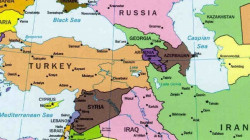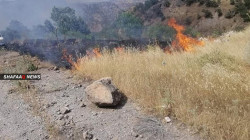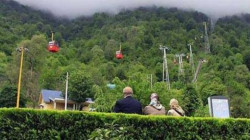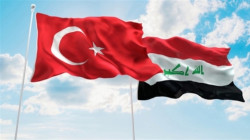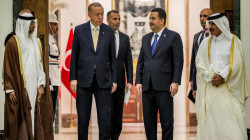"Water War" looms in the Middle East horizon
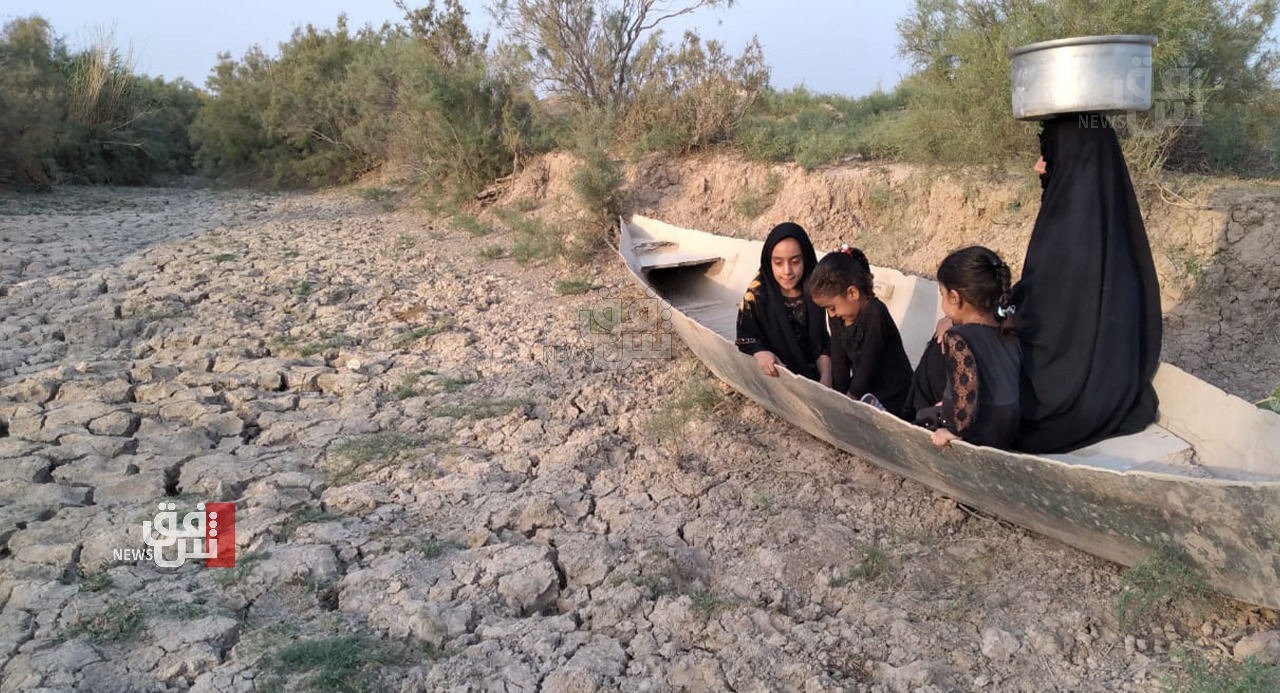
Shafaq News / World Water Day, observed annually on March 22nd, has held significant global importance since its establishment by the United Nations in 1992.
Against the backdrop of escalating climate change concerns worldwide, this day serves as a reminder of water's critical role in sustaining life and ecosystems.
In the context of the Middle East, where geopolitical tensions often intersect with environmental challenges, World Water Day takes on added significance.
This year, as the region grapples with looming threats of conflict exacerbated by water-related issues, the theme chosen by the United Nations, "Water for Peace," highlights the urgent need to address water scarcity and pollution as a means to foster stability and harmony among nations.
THE THREE CRISES
In this context, the Middle East and North Africa region is poised to be one of the most affected and vulnerable areas to global climate change, particularly due to the scarcity of water resources resulting from it. This reality has become evident in many countries within this region.
According to estimates by the Washington Institute for Near East Policy, population pressure will directly impact governments, forcing them to make stringent choices in confronting this existential challenge.
This, in turn, will influence their domestic and foreign policies, especially concerning control over shared water resources among countries. Such resources are expected to be the region's primary cause of conflicts and disputes.
Governments' stances and handling of these issues raise the likelihood of future "water wars."
In this particular setting, three water crises in the Middle East stand out as the most sensitive and pressing, especially considering that the water security of over half a billion people is tied to the resolution of these crises.
These crises include the Tigris and Euphrates water crisis between Iraq, Turkiye, and Iran, the Nile River crisis between Egypt, Sudan, and Ethiopia, and the shared water crisis between Jordan and Israel.
The history of relations among these countries, most of which have experienced wars, ethnic and nationalist differences, and political disputes, directly affects the issue of shared water resources.
This is especially true with the political manipulation of the "water security" card in the context of pressure and influence. Such manipulation raises concerns about the future trajectory of relations among these countries, particularly with the exacerbation of water crises and increasing drought conditions.
IRAQ AND THE WATER WAR
Water scarcity poses a significant challenge in Iraq due to natural and human factors.
Situated in an arid and semi-arid region, Iraq heavily relies on the Tigris and Euphrates rivers for its water supply, which originates from upstream countries. However, changes in upstream water management policies, recurrent droughts exacerbated by climate change, and poor water management practices have strained water resources in the country.
Inefficient irrigation techniques, outdated infrastructure, and inadequate wastewater treatment facilities contribute to water wastage and pollution. This scarcity impacts agriculture, the economy, and public health, exacerbating socio-economic vulnerabilities.
Moreover, regional tensions over transboundary water issues further complicate efforts to address water scarcity.
Addressing this challenge requires comprehensive strategies focused on sustainable water management, infrastructure development, conservation measures, and regional cooperation to ensure equitable access to water resources and mitigate the impacts of water stress on communities and ecosystems.
In the historical land known as Mesopotamia, Iraq faces mounting concerns over the potential loss of its vital lifelines, the Tigris and Euphrates rivers.
These rivers have been the cradle of civilization for millennia, nurturing diverse populations along their banks. However, they are now witnessing unprecedented historical declines in their water levels due to various factors, some linked to climate change and others stemming from the policies of upstream countries, namely Turkiye and Iran.
In June 2022, the Iraqi Parliament's Vice President, Hakim al-Zamili, issued a warning during a press conference, threatening to pass legislation criminalizing commercial dealings with Turkiye and Iran. This was in response to these countries' retention of river waters without considering Iraq's water needs.
Although such legislation has yet to materialize, it served as a stark indicator of the crisis facing Iraq.
Last year, Iraq was compelled to drastically reduce agricultural areas, depriving governorates of their main agricultural activities to secure water. This move posed a significant threat to the food security of Iraqis, as announced by the Iraqi Ministry of Agriculture at the time.
The roots of the crisis among the three countries lie in their divergent views on shared water resources.
While the United Nations defines international rivers as "watercourses that traverse different countries," Turkiye and Iran disagree with applying this definition to the rivers shared with Iraq. Neither country has signed the United Nations Convention on the Law of the Non-Navigational Uses of International Watercourses of 1997, exempting them from compliance with international law in this regard.
According to the United Nations, more than three billion people worldwide rely on water that crosses national borders. However, only 24 countries have cooperation agreements concerning all their shared waters.
TURKISH POLICY
Turkiye's interpretation of the nature of the Tigris and Euphrates rivers relies on an ancient theory that grants absolute sovereignty to a state over everything within its territory, including river waters, without restriction.
Accordingly, it has the right to establish any projects it deems fit to utilize these waters and to make any alterations, including changing the course of the river, regardless of the resulting harm to the interests of other countries.
On this basis, Turkiye has embarked on constructing many dams on the Tigris and Euphrates rivers and their tributaries as part of the "Great Southeastern Anatolia Project." This massive plan aims to build 22 dams and 19 hydroelectric power stations over several decades to provide water for irrigation and generate electricity in the least developed region of Turkiye.
According to Iraq, these projects have come at the expense of its share of the river waters, while Ankara considers them necessary due to its vulnerability to climate change, affecting the amount of precipitation from rain and snow and rising temperatures, leading to its own "water resource shortage."
On the other hand, Tukiye criticizes Iraq's water investment policies, arguing that it does not benefit sufficiently from the waters flowing to it through the Tigris and Euphrates rivers.
Therefore, it believes Iraq could relinquish the waters of the Euphrates and rely solely on those of the Tigris.
Turkiye calls for the construction of dams to retain water and the development of irrigation methods, considering it pointless to release water that "will end up in the Gulf without being utilized."
WATER FILE MANAGEMENT
In this context, Iraqi journalist specialized in climate and environmental affairs, Khalid Sulaiman, in an interview with Alhurra, clarified that "Iraq already has a problem with the old and traditional management of its water, resources, infrastructure, and pollution resulting from human activity, while the significant population growth in Iraq also poses a problem in this regard with the dwindling natural resources. "
According to the United Nations, "demand for freshwater has been growing at a rate of 1% annually since the 1980s, resulting in a continuous increase in the number of regions experiencing water scarcity."
"Currently, about two billion people live in areas facing significant water pressure, while around four billion people live in regions experiencing acute water scarcity for at least 30 days a year. "
Meanwhile, Iraqi activist and environmental expert Jasim Al-Asadi pointed out that "Iraq allocates between 75 to 85% of its water to agriculture, due to its reliance on open irrigation channels known as the "Sumerian method," making its water consumption "unbalanced". Therefore, Iraq must address the wasteful mindset regarding water consumption both at the governmental and individual levels."
However, this does not mean that "Turkish demands are logical," according to experts, especially concerning the construction of dams that prevent the flow of water to the Gulf, which would pose a significant environmental problem with the extension of the "salt tongue" from the Gulf into Iraqi territory if the flow of freshwater is cut off, threatening southern Iraq and its soil.
Despite the evident impacts of climate change, Al-Asadi believed, in his conversation with Alhurra, that "it is not solely responsible for Iraq's problem," emphasizing that "geopolitical factors in neighboring countries play a significant role."
FORMAL AGREEMENTS
In September 2021, Iraq announced reaching significant agreements regarding the water file with Turkiye, following the Turkish government's signing of a memorandum of understanding prepared in 2009.
This memorandum outlined general frameworks for agreements in water management between the two countries and partnerships to implement investment projects within Iraq, preserving its water rights. However, these agreements fell through in subsequent years, during which Iraq experienced its most severe droughts in history.
As a result, the only agreement considered valid to date is the one between Turkiye and Syria since 1987. According to this agreement, Ankara pledged to provide Damascus with an annual rate of 500 cubic meters per second, with Syria and Iraq sharing this quantity.
However, both Iraq and Syria accuse Turkiye of not adhering to this quantity, which has decreased in recent years to less than half during certain periods, with visible effects on the Euphrates River.
THE PROBLEM WITH IRAN
On the other hand, Iran completely blocks essential tributaries to the Tigris River, such as the Zab River, and the tributaries of the Darbandikhan Dam and the Hamrin and Dokan Lakes. This has led to a major crisis in the Diyala River basin, where its level has decreased by 75%.
According to Iraqi officials ' statements, eastern and southern Iraq suffered from severe drought crises, especially in 2021 and the summer of 2023, when water releases from the Iranian side were zero.
The story of shared water between Iraq and Iran differs from the situation with Turkiye. The two countries signed an agreement in 1975 to share the joint water, known as the "Algiers Agreement," which allocated shares of the Shatt al-Arab River.
However, after the war that erupted between the two countries, former Iraqi President Saddam Hussein withdrew from the agreement in 1980, considering the Shatt al-Arab waters as entirely belonging to Iraq. This justification is what Iran uses today to not adhere to granting Iraq its water shares.
Although the quantity of water from Iran to Iraq is much less than that from Turkiye, the crisis with Iran is more complicated, according to Suleiman.
He added that "since 2017, Iranian officials have clearly stated that they are facing a water problem and that they will prevent rivers from reaching any other country, including Iraq."
He further stated in his interview with Alhurra that the Iranian position is more rigid and damaging to the environment. "Even Iranian officials do not listen to their Iraqi counterparts when talking about this issue, and they do not care about the proposals, as reported by Iraqi officials."
This puts Iraq, which the United Nations considers the fifth most affected country by climate change, in a critical position of instability in its water security. Water security has been among the main reasons for social unrest nationwide since 2018.
However, the country seems far from achieving its goals through negotiations with Turkiye and Iran, despite repeated appeals directed to both sides with each drought wave or water cutoff from its territories.
"ARMED WATERS"
All of this raises questions about whether the existential threat posed by the water crisis to around 40 million Iraqis will affect Iraq's official handling of the issue and its relations with neighboring countries.
It could escalate tensions to a level that may lead to a crisis similar to the one suggested by the Iraqi Deputy Parliament Speaker, i.e., cutting off trade relations, which could be seen as an "arming" of the water file from the opposite side to pressure Iraq.
Al-Asadi confirmed that the water file is "already armed," adding that "water is a geopolitical tool used by both Iran and Turkiye." He emphasized that "even dam projects are essentially political projects."
The Iraqi environmental activist considered the voices calling for trade boycotts as nothing more than "populist electoral talk that is meaningless and illogical."
He believed Iraq had no choice but to negotiate further with Turkiye and Iran.
"Through negotiations, each country's intentions and desires toward the other are determined. These matters can be discussed with neighboring countries with which Iraq has a high trade balance, reaching $14 billion with Turkiye and around $8 billion with Iran, which is an influential factor in itself."
However, Suleiman expressed his concern that things "may have taken too long to reach agreements," considering that "the pressure of the climate change crisis and water scarcity may make each party more rigid in negotiations than when water was abundant. This could delay any forthcoming agreement, and Iraq might remain at a loss."
If negotiations fail to reach fair solutions, Suleiman says, "Iraq will have no choice but to resort to international courts."
"This option has been raised in Iraq before, but it did not reach The Hague due to internal political tug-of-war, especially since reaching it would mean further damage in relations between these countries, which could lead to political and perhaps security crises that are not in Iraq's interest as the receiving country."
